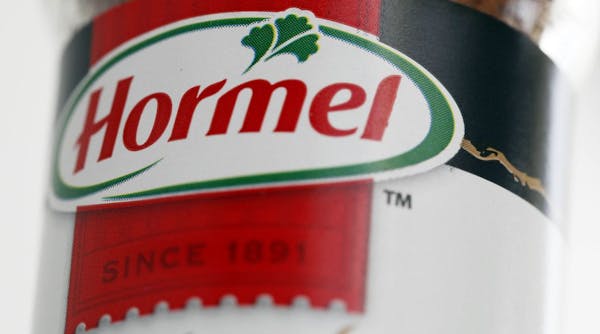Medtronic was hit hard by changes in medical care because of the coronavirus pandemic, reporting Tuesday that net income for its second quarter was down 64%.
Still, while most of the Minnesota-run medical device company's benchmarks were down year over year, the decreases were not nearly as much as expected. And company officials believe that hospitals, even with high COVID-19 caseloads, are now able to manage care for other ailments as well.
There is, said Chief Financial Office Karen Parkhill, a "sense of recovery."
So far, sales are up in the third financial quarter, she told analysts in an earnings call Tuesday.
Medtronic Chief Executive Geoff Martha and Parkhill credited a learning curve in the treatment of COVID-19 with hospitals' willingness to perform elective procedures, even during the current spike in cases.
"Hospitals are much more comfortable treating COVID patients" than in the early months of the pandemic, Martha said in an interview.
Those advances have made patients who were once fearful of entering the health care system for elective procedures less worried, he said.
Overall, elective procedures are "not quite back to pre-COVID levels," Martha said. But certain kinds of elective treatments, such as those for heart attacks and strokes, are.
Medtronic has sponsored seminars to make sure the return to these procedures come with protocols that encourage best practices and safety, Martha said.
Two situations could "derail" the elective surgery rebound, Martha said.
The first would be if medical facilities run out of space as the number of hospitalized COVID-19 patients grows because of the pandemic spike.
The second would be the reimposition of mandates that suspend elective procedures to preserve hospital capacity, equipment and personnel to treat patients infected with the virus.
Martha said the hospital administrators he talks to believe such prohibitions are unnecessary given the current state of COVID-19 care. Moreover, larger hospital chains have the ability to transfer patients to create capacity as it is needed.
"We're seeing a faster-than-expected recovery and approaching year-over-year growth," Martha said in a news release. "Our revenue growth is improving, our pipeline is advancing, and we're gaining share in an increasing number of businesses."
Among the company's existing product base, ventilators used to treat COVID-19 patients showed extraordinary sales, increasing nearly fourfold from the second quarter of fiscal 2020. While ventilator sales will decline as the country gains control of the pandemic with vaccines, other medical device sectors could push revenue growth up going forward.
The company's long-term prospects are good because of robust product launches and market share gains. The Food and Drug Administration has approved 180 products since the beginning of 2020, Martha said.
Despite the positive signs, the company declined to offer future financial guidance because of the short-term uncertainty caused by the pandemic.
For the second quarter, Medtronic beat analysts' estimates for earnings per share, revenue and organic growth.
Medtronic booked $7.65 billion in revenue in the quarter, down from $7.7 billion in the comparable time period last year but significantly exceeding an expectation of $7.08 billion by Wall Street.
Net income was $489 million, or 36 cents a share, down from $1.4 billion, or $1.01 a share, in the same quarter last year. Adjusted earnings per share, though, was $1.02, ahead of analysts' consensus estimate of 80 cents.
In earlier earnings calls, the company said it expected to return to positive growth by the end of the 2021 fiscal year, which is in May.
It continues on that track, Parkhill said.
Improved "non-U. S. developed" revenue accounted for part of the trend. It accounted for 32% of all revenue and grew 1% year over year. In comparison, U.S. revenue accounted for 53% of the total, but was down 2% year over year.
Martha said a new operating model focuses the company on market share.
Among other strategies, Medtronic will move aggressively to establish a strong foothold in the treatment of diabetes, officials said. The company also hopes to turn its cardiac ablation technology into a first-line treatment for atrial fibrillation.
Ashtyn Evans, a stock analyst with Edward Jones, called Medtronic's performance "solid relative to expectations" and maintained the company's "Buy" rating.
"Volumes continue to increase faster than expected and the company is approaching growth," Evans said. "Volumes have increased each month from the levels seen in April, and sales were nearly 18% higher than last quarter. Medtronic is gaining share in several businesses."
Medtronic's stock on Tuesday closed at $114.06, up nearly 3%.
Jim Spencer • 202-662-7432
American Express, Fifth Third rise; Netflix, PPG Industries fall, Friday, 4/19/2024
![Capella Tower at 225 South Sixth St. Tuesday September 6, 2011. ] GLEN STUBBE * gstubbe@startribune.com Minneapolis skyline from the 51st floor of IDS](https://arc.stimg.co/startribunemedia/7C263DJZQTPRDEXI74SMH2M3HI.jpg?h=91&w=145&fit=crop&bg=999&crop=faces)
Two major downtown Minneapolis towers face change as hybrid shuffle continues

